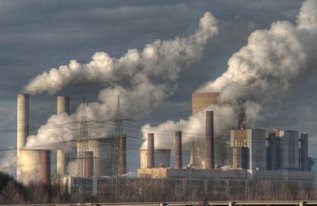Yesterday and today, the EPA held hearings on its proposed rule to leave standards for particle pollution unchanged. There will be another hearing tomorrow, and one on May 27.
What is particle pollution?
Particle pollution, or particulate matter, is air pollution made up of very small particles. Particle pollution is not a gas, but little bits of carbon or other material that are small enough to float or stay in the air. It includes soot, smoke, and other particles that mostly come from burning fossil fuels – for transportation, for power, and for industry. Particle pollution from power plants or diesel engines can contain heavy metals such as lead or mercury, and chemicals that are carcinogens. As the little particles float in the air, we breathe them deep into our lungs – carbon, chemicals, and heavy metals included. And many rivers and lakes in the southeast are contaminated with mercury that started as particle pollution from power plants – which means we have to limit how much fish we can catch and eat.
Particle pollution is put into categories by its size: coarse particles, fine particles, and ultrafine particles. They are all too small to see without a microscope, and they all harm our health.
Particle pollution can cause preterm birth, lower birthweight, decreased lung growth in teens, exacerbations of asthma and emphysema, heart disease, lung disease, strokes, and cancer. It has been linked to dementia, chronic kidney disease, and many other health conditions. Particle pollution can affect people’s ability to learn at school, or do their jobs well. And, numerous studies show that particle pollution makes people more likely to get viral lung infections, including influenza and coronavirus.
Because of the structural racism in our country, many communities of color are more exposed to particle pollution. This is because we built highways, factories, and power plants in or next to communities of color.
The American Lung Association’s 2020 State of the Air Report showed 2 cities in the Southeast, Birmingham and Alabama, were in the top 25 most polluted cities for long term (annual) particle pollution.
There is still time to register to listen to the EPA hearing on May 22 or 27. Anyone is welcome to listen an EPA hearing: moms, dads, grandparents, scientists, health professionals – anyone. You can hear why people care about clean air. Unfortunately they have filled up all the speaker time slots so it is no longer possible to sign up as a speaker.





